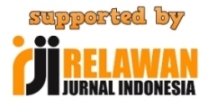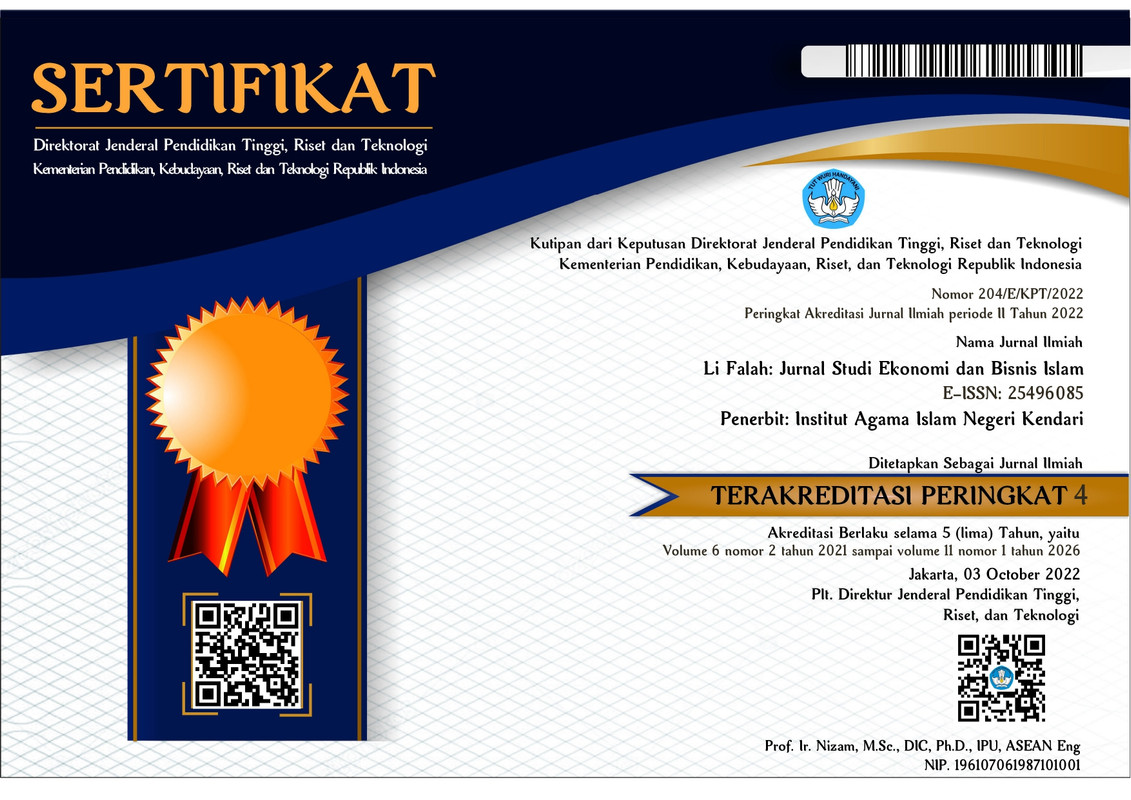Analysis of the Determinants of Islamic Social Reporting with Debt to Equity Ratio as a Moderating Variable
Abstract
This research aims to see the influence of Company Size, Financing To Deposit Ratio, and Profitability on Islamic Social Reporting by adding Debt To Equity Ratio as a moderating variable. This research is a type of quantitative secondary data research, namely Sharia Banking 2016-2020. There were 10 Sharia Commercial Banks as samples in the research, which were obtained using the purposive sampling method with criteria determined by the researcher. For final results, researchers used Moderate Regression Analysis (MRA). The data analysis tool uses the E-Views 9 application. The research results show that company size influences Islamic Social Reporting. Financing To Deposit Ratio and Profitability do not affect Islamic Social Reporting. Then, the Debt To debt-equity ratio is also unable to moderate Company Size and Financing To Deposit Ratio. However, the Debt To debt-to-equity ratio is able to moderate the profitability of Islamic Social Reporting. It is hoped that this research can be a source of information for financial institutions or Islamic banks to be more careful in their social and environmental activities.
Keywords
Full Text:
PDFReferences
Aghani, V., Zahra, H., & Irkhami, N. (2021). Analisis Pengaruh Mekanisme Good Corporate Governance, Financing To Deposit Ratio, Dan Ukuran Perusahaan Terhadap Profitabilitas Dengan Corporate Social Responsibility Sebagai Variabel Moderasi Pada Perbankan Syariah Di Indonesia Periode 2015-2019 Analysi. Jurnal Nisbah, 7(1), 23–30.
Aguspriyani, Y. (2021). Pengaruh Non Performing Financing (NPF) Terhadap Profitabilitas Bank Umum Syariah Di Indonesia Pada Masa Pandemi Covid-19. Jurnal Keilaman, Kemasyarakatan Dan Kebudayaan, 22(1), 1–12.
Ahmad, S., Wasim, S., Irfan, S., Gogoi, S., Srivastava, A., & Farheen, Z. (2019). Qualitative v/s. Quantitative Research- A Summarized Review. Journal of Evidence Based Medicine and Healthcare, 6(43), 2828–2832. https://doi.org/10.18410/jebmh/2019/587
Alawiyah, T., & Mais, R. G. (2020). Pengaruh Profitabilitas, Leverage, Likuiditas, Dan Dewan Komisaris Independen Terhadap Pengungkapan Islamic Social Reporting (Isr) Pada Perbankan Syariah di Indonesia Tahun 2015-2018. S1 Akuntansi, 29(02), 1–25. http://repository.stei.ac.id/1315/
Arianugrahini, I., & Firmansyah, E. A. (2020). Determinan Pengungkapan Islamic Social Reporting (ISR) pada Perbankan Syariah di Indonesia (Determinants of Islamic Social Reporting (ISR) Disclosure at Islamic Commercial Banks in Indonesia). Perisai : Islamic Banking and Finance Journal, 4(2), 88–101. https://doi.org/10.21070/perisai.v4i2.841
Fauzi, M., Hasan, A., & Oktari, V. (2020). Pengaruh Intellectual Capital, Kinerja Lingkungan dan Komite Audit Terhadap Kinerja Keuangan. Jurnal Kajian Akuntansi Dan Bisnis Terkini, 1(1), 89–105.
Fitria, D., & Irkhami, N. (2021). Ukuran Perusahaan Sebagai Pemoderasi Pengaruh Struktur Modal, Profitabilitas, Dan Islamic Social Reporting Terhadap Nilai Perusahaan Pada Bank Umum Syariah. Jurnal Ilmiah Ekonomi Islam, 7(03), 1629–1643. http://e-repository.perpus.iainsalatiga.ac.id/id/eprint/10777
Handoko, Y. (2014). Implementasi Social and Environmental Disclosuredalam Perspektif Teoritis. Jurnal JIBEKA, 8(1).
HS, S. (2016). Corporate Social Responsibility dan Pemberdayaan Masyarakat (Studi Komparatif Bank Syariah dan Bank Konvensional). INDO-ISLAMIKA, 6(1), 22–54.
Ibrahim, R. H., & Muthohar, A. M. (2019). Pengaruh Komisaris Independen dan Indeks Islamic Social Reporting Terhadap Nilai Perusahaan dengan Profitabilitas Sebagai Variabel Intervening. Jurnal Ilmiah Ekonomi Islam, 5(01), 9. https://doi.org/10.29040/jiei.v5i01.378
Kurniawati, M., & Yaya, R. (2017). Pengaruh Mekanisme Corporate Governance, Kinerja Keuangan dan Kinerja Lingkungan terhadap Pengungkapan Islamic Social Reporting. Jurnal Akuntansi Dan Investasi, 18(2), 163–171. https://doi.org/10.18196/jai.180280
Latifah, H. C., & Suryani, A. W. (2020). Pengaruh kebijakan dividen, kebijakan hutang, profitabilitas, dan likuiditas terhadap harga saham. Jurnal Akuntansi Aktual, 7(1), 31–44. https://doi.org/10.17977/um004v7i12020p31
Lindawati, A. S. L., & Puspita, M. E. (2015). Corporate Social Responsibility: Implikasi Stakeholder dan Legitimacy Gap dalam Peningkatan Kinerja Perusahaan. Jurnal Akuntansi Multiparadigma, 157–174. https://doi.org/10.18202/jamal.2015.04.6013
Lontah, E. N. (2015). Stakeholder Theory Dan Karya Keselamatan Schindler. Refleksi Hukum: Jurnal Ilmu Hukum, 9(1), 37. https://doi.org/10.24246/jrh.2015.v9.i1.p37-50
Majid, F. A. (2020). Pengaruh Karakteristik Keuangan, Dewan Komisaris, Dan Kepemilikan Saham Publik Terhadap Pengungkapan Islamic Social Reporting (ISR) (Studi Empiris pada Perusahaan Manufaktur yang Terdaftar di Indeks Saham Syariah Indonesia) [Universitas Muhammadiyah Surakarta]. http://www.akrabjuara.com/index.php/akrabjuara/article/view/919
Masrurroh, D. A., & Mulazid, A. S. (2017). Analisis Pengaruh Size Perusahaan, Capital Adequacy Ratio (CAR)Return On Asset (ROA), Financing Deposit Ratio (FDR) Terhadap Pengungkapan Corporate Social Responsibility (CSR) Bank Umum Syariah Di Indonesia Periode 2012-2015. Human Falah, 4(1), 1–18. https://core.ac.uk/download/pdf/266976174.pdf
Muhammad, R., Abdul, R. M., & Mahfudnurnajamuddin. (2020). Pengaruh Debt To Equity Ratio ( DER ), Non Performing Loan ( NPL ), Loan To Deposit Ratio ( LDR ) dan Pertumbuhan Perusahaan terhadap Profitabilitas pada Perusahaan Sektor Perbankan yang Terdaftar di Bursa Efek Indonesia. Paradoks: Jurnal Ilmu Ekonomi, 3(2), 97–111.
OJK. (2020). SPS Perbankan Syariah 2020. Ojk.
Prasetyoningrum, A. K. (2019). Pengaruh Ukuran Perusahaan, Profitabilitas, Leverage, Efisiensi Biaya, Dan Umur Perusahaan Terhadap Islamic Social Reporting (ISR) Pada Perbankan Syariah Di Indonesia. MALIA: Journal of Islamic Banking and Finance, 2(2), 147. https://doi.org/10.21043/malia.v2i2.4780
Silanno, G. L., & Loupatty, L. G. (2021). Pengaruh Current Ratio , Debt To Equity Ratio Dan Return On Asset Terhadap Financial Distress Pada Perusahaan-Perusahaan Di Sektor Industri Barang Konsumsi (Studi Empiris Di Bursa Efek Indonesia). 2(07), 85–109.
Somantri, Y. F., & Sukmana, W. (2020). Analisis Faktor- Faktor yang Mempengaruhi Financing to Deposit Ratio (FDR) pada Bank Umum Syariah di Indonesia. Berkala Akuntansi Dan Keuangan Indonesia, 4(2), 61. https://doi.org/10.20473/baki.v4i2.18404
Syafiqa K, N. A., Ishak, N., Hamzah, S. R., Abdul Halim, N., & Nurullah R, A. F. (2021). Assessing The Financial Performance Of Takaful Operators In Malaysia Through Return On Assets And Return On Equity. Science Proceedings Series (SPS), 3(1), 83–85.
Tangngisalu, J., Hasanuddin, R., Hala, Y., Nurlina, N., & Syahrul, S. (2020). Effect of CAR and NPL on ROA: Empirical study in Indonesia Banks. Journal of Asian Finance, Economics and Business, 7(6), 9–18. https://doi.org/10.13106/JAFEB.2020.VOL7.NO6.009
DOI: http://dx.doi.org/10.31332/lifalah.v8i1.3983
Copyright (c) 2023 Febi Wulandari Purwaningsih

This work is licensed under a Creative Commons Attribution-ShareAlike 4.0 International License.
Li Falah : Jurnal Studi Ekonomi dan Bisnis Islam, Indexed In
Accredited By
View My Stats
Organized by : Fakultas Ekonomi dan Bisnis Islam
Published by : Institut Agama Islam Negeri Kendari
Jl. Sultan Qaimuddin No. 17 Baruga Kota Kendari Provinsi Sulawesi Tenggara
phone. +62401-3193710
Fax. +62401-3193710
Email: [email protected]



















